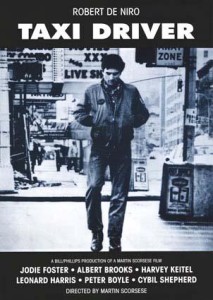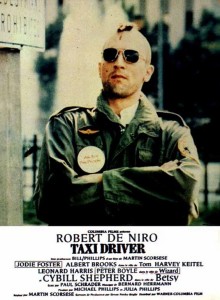In 1976 Martin Scorsese and Robert De Niro gathered together for a second time to make the film Taxi Driver. The film centers around Travis Bickle, an antihero that sees himself as a cure for the disgusting streets of 1970s New York City.
Taxi Driver, like all of the other films on this list, has been written about and studied extensively and I don’t know what more I would be able to find. For me it is difficult to say whether Bickle is a complex character or just a sociopath. What he sees as he drives around the city is a film of scourge and depravity that someone needs to scrub away. It is unclear whether it’s that his first hope is in a politician that quickly falls from his good graces that causes him to decide to start making a difference himself.
One thing about Taxi Driver that is fairly complex is the pacing. At times the movie progresses at a fast clip and sometimes it seems to drag on. As soon as you start to feel a conclusion is approaching, the film veers on to a tangent story that was only briefly hinted at by intensely creepy scenes, with Bickle slowly driving past an underaged sex worker portrayed by a very young Jodie Foster.
The sick feeling you have already gotten in your stomach from the brief scenes starts to bubble in your esophagus when De Niro negotiates a price with Foster’s pimp, played by a longhaired Harvey Keitel. The litany of services that Keitel describes should make a viewer want to eject the disc and throw it out the window in disgust.
While the first half of the film focuses on a love story sprinkled with casual racism, the second half shows a city that a visitor would only start to notice after spending enough time to see past the glamour the city shines with. It’s a dark, depraved, greasy city of the ‘70s where hiring a twelve-year-old sex worker will set you back $15. Bickle seems like a creepy knight in shining armor after his first meeting with Foster, leading to the climax of film.
Something about Martin Scorsese many agree on is that he is a living, breathing, master-class of the cinema with few people his equal. This makes my ideas of an alternate ending seem like folly. Personally I would have cut the film after the long tracking shot after the police enter the room, leaving the rest on the floor. If that didn’t happen, I would have considered another cut before he picks up his last fare. Again, Scorsese doubtlessly knows much better than I ever will.
I was a vastly different person the first time I watched Taxi Driver and a long time has passed since that first time. I am afraid of how I would have digested it the first time. No matter how much I detest his actions, there is a level of empathy and heroism in Bickle that I wish was more prevalent in society. I would like to say that there are better ways to go about changing the world. It is wildly important that we try.
Taxi Driver is a film that I will recommend to most people. Of the films that I have watched with this project this would probably have the hardest R rating, but it i the altruism that viewers need in their lives.
Trailer
Important Links

